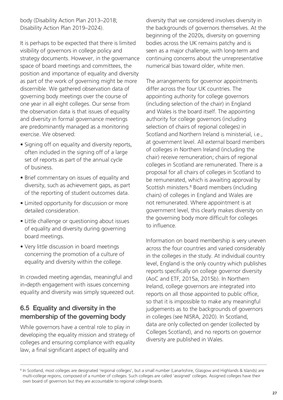
27
body (Disability Action Plan 2013-2018;
Disability Action Plan 2019-2024).
It is perhaps to be expected that there is limited
visibility of governors in college policy and
strategy documents. However, in the governance
space of board meetings and committees, the
position and importance of equality and diversity
as part of the work of governing might be more
discernible. We gathered observation data of
governing body meetings over the course of
one year in all eight colleges. Our sense from
the observation data is that issues of equality
and diversity in formal governance meetings
are predominantly managed as a monitoring
exercise. We observed:
• Signing off on equality and diversity reports,
often included in the signing off of a large
set of reports as part of the annual cycle
of business.
• Brief commentary on issues of equality and
diversity, such as achievement gaps, as part
of the reporting of student outcomes data.
• Limited opportunity for discussion or more
detailed consideration.
• Little challenge or questioning about issues
of equality and diversity during governing
board meetings.
• Very little discussion in board meetings
concerning the promotion of a culture of
equality and diversity within the college.
In crowded meeting agendas, meaningful and
in-depth engagement with issues concerning
equality and diversity was simply squeezed out.
6.5��Equality�and�diversity�in�the�
membership�of�the�governing�body�
While governors have a central role to play in
developing the equality mission and strategy of
colleges and ensuring compliance with equality
law, a final significant aspect of equality and
diversity that we considered involves diversity in
the backgrounds of governors themselves. At the
beginning of the 2020s, diversity on governing
bodies across the UK remains patchy and is
seen as a major challenge, with long-term and
continuing concerns about the unrepresentative
numerical bias toward older, white men.
The arrangements for governor appointments
differ across the four UK countries. The
appointing authority for college governors
(including selection of the chair) in England
and Wales is the board itself. The appointing
authority for college governors (including
selection of chairs of regional colleges) in
Scotland and Northern Ireland is ministerial, i.e.,
at government level. All external board members
of colleges in Northern Ireland (including the
chair) receive remuneration; chairs of regional
colleges in Scotland are remunerated. There is a
proposal for all chairs of colleges in Scotland to
be remunerated, which is awaiting approval by
Scottish ministers.8 Board members (including
chairs) of colleges in England and Wales are
not remunerated. Where appointment is at
government level, this clearly makes diversity on
the governing body more difficult for colleges
to influence.
Information on board membership is very uneven
across the four countries and varied considerably
in the colleges in the study. At individual country
level, England is the only country which publishes
reports specifically on college governor diversity
(AoC and ETF, 2015a, 2015b). In Northern
Ireland, college governors are integrated into
reports on all those appointed to public office,
so that it is impossible to make any meaningful
judgements as to the backgrounds of governors
in colleges (see NISRA, 2020). In Scotland,
data are only collected on gender (collected by
Colleges Scotland), and no reports on governor
diversity are published in Wales.
8 In Scotland, most colleges are designated 'regional colleges', but a small number (Lanarkshire, Glasgow and Highlands & Islands) are
multi-college regions, composed of a number of colleges. Such colleges are called 'assigned' colleges. Assigned colleges have their
own board of governors but they are accountable to regional college boards.